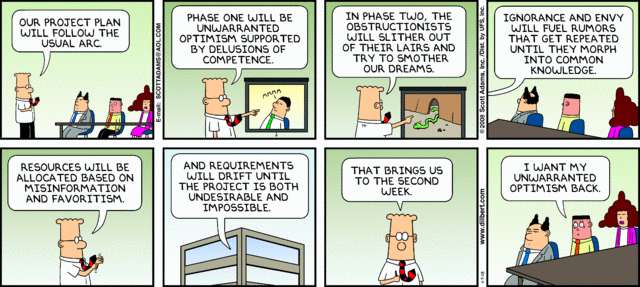
5 Possible Outcomes of Website Planning
He who fails to plan, plans to fail
A journey of a thousand miles starts with the first step. But if you don't plan properly you may end up 2,000 miles from where you wanted to go.
Good fortune is what happens when opportunity meets with planning.
Any web developer worth their salt knows planning is critical to a website's success. Yet despite this universal truism, many websites are created without any real planning. Often there's no budget, time, or it's not seen as important. Another common misconception is that if you hire skilled web developers, planning is par for the course. Unfortunately, it just doesn't work that way. Planning is something that must be organized and committed to.
This way of thinking leads to sites that are under-planned, where success, if any, is a matter of luck. This dynamic of under-planning is significantly more prevalent in down economies. (Psst, I am talking about right now.) I even joke when people ask me what LevelTen does, I explain:
During recessions we do a lot of website design, development and online marketing. During good times, we do a lot of strategic consulting to make up for all the lack of planning that was not done during recessions.
Why do we plan?
We know that planning is important – but why? What do we really get out of planning?
When I ask this question at seminars, the popular answers I get are:
- So the client gets what they want
- So everybody knows what we are building and how we are going to build it
- To minimize risk
- To provide solid estimates for budget and time
The primary focus of most website planning is to produce certainty and efficiency. As humans, the oldest parts of our brains are wired to seek predictability. Much of what is done during planning is creating certainty in the form of the iron triangle; define what is being built (scope), how much is it going to cost, and how long is it going to take. The theory for efficiency is that it's cheaper to design requirements on paper than to fix code.
To put it another way: measure twice, cut once.
Are there any more reasons? Anyone, anyone
Overwhelmingly, the reasons people give for planning focus on certainty and efficiency otherwise known as tactical website planning. Planning at a strategic level, needs to be focused on two things: enhanced user experience and maximized returns.
End-users don't want features, they want benefits. Website strategic planning needs to focus relentlessly at what most benefits the end user. The top websites in every niche do one thing better than its competition; it provides the maximum utility for end users.
Stakeholders tend to talk in features. They want the site to be cool looking, they want widget X, they want to integrate with sites Y, etc. Those features are great, but they are tactical. What organizational oriented stakeholders really want are benefits: increased site traffic, conversion rates, membership enrollment, etc. What they need is for the site to produce real, tangible value for the organization.
Ultimately, the two of these work together. A strategically well planned site will produce both a great end-user experience and value for stakeholders. Stakeholder value makes the endeavor sustainable, enabling reinvestment back into enhancing the end-user experience thus creating more stakeholder value.
Tactical vs. Strategic website planning
"He who fails to plan, plans to fail" We know we need to plan, but why? To get to where we want to go. But how do we know where we want to go? By planning.
There are two levels of planning every truly successful endeavor must go through:
Tactical - how do we get there?
Strategic - where do we want to go?
Tactical is about the features, the techniques and process. We need it to make sure we arrive at the chosen destination as efficiently and painlessly as possible.
If, however, that destination does not provide value to end-users and stakeholders, what's the point? Strategic planning analyzes the higher needs that are required for organizational success.
Of course, the two types of planning reinforce each other. Strategic planning is about uncovering opportunities and tactical about achieving your strategic plan. When done properly, they are the keys for success or as Thomas Alva Edison once said,
"Good fortune is what happens when opportunity meets with planning."
The 5th outcome
There is one more outcome from planning. Anyone, anyone?
He are some hints:
- We don't want it
- The larger the committee the more of it that tends to get produced
- Scott Adams, of Dilbert fame, has made a living illustrating large organizations remarkable efficiency of producing it (see below)

Answer: waste
Anytime you are not producing one of the other four outcomes, you are producing waste. Unfortunately, waste is a natural by-product of planning. Your goal of course is to provide as much value while minimizing waste.
The 5 outcomes of planning
And in summary, the five outcomes are:
- Certainty
- Efficiency
- Enhanced end user experience
- Maximum returns
- Waste
Whenever your are in site planing, stop and ask yourself; which of the five are we currently doing and which should we be doing?

